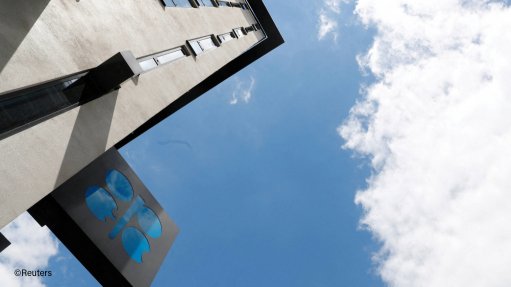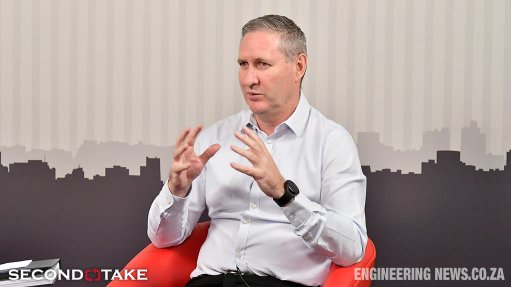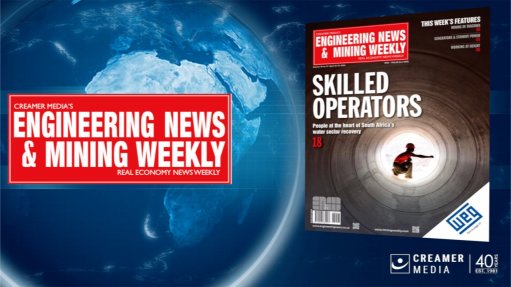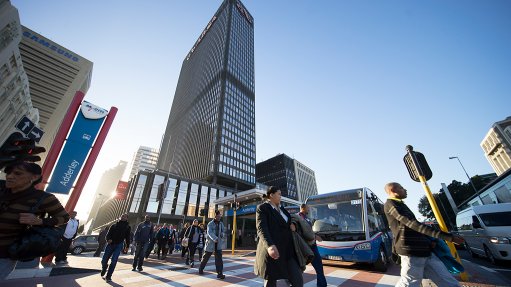Media company develops new OHS training tech

Mark Hocker discusses the advantages of visual health and safety demonstrations. Camerawork: Nicholas Boyd. Editing: Shane Williams. Recorded 08.01.2015
Multimedia production company The Boiler Room has, over the past 18 months, been developing its existing games engine that enables companies to build three-dimensional (3D) versions of their work environments for training purposes.
Company MD Mark Hocker tells Engineering News that The Boiler Room is developing training programs for the Oculus Rift virtual reality headset. This headset, which fits like a pair of snorkelling goggles, enables a trainee to experience a 3D virtual reality environment as if it were a real room.
The Oculus Rift also features motion tracking, which means that the room perceived by the trainee changes at the turn of his or her head. Hocker believes this to be especially advantageous for any large-scale project that requires training for, besides others, working on scaffolding, operating in confined spaces and forklift driving.
He reveals that the company is developing a risk-based paper-making machine simulator for a paper company, which entailed the creation of a digital model of a 100 m long, six-storey-high paper-making machine, programming into it a number of health and safety hazards.
Hocker adds that the mining industry is also showing strong interest in Oculus technology. The Boiler Room is developing a 3D risk-based mining game for mining giants BHP Billiton that simulates an entire underground coal mine.
Oculus is a significantly different learning tool, compared with conventional computer training programs, owing to its impact on cost reduction, he maintains.
Hocker explains that training programmes requiring a sense of scale benefit from incorporating Oculus Rift technology into health and safety training, as it allows for significant cost reductions, compared with using a room-sized cave automatic virtual environment (CAVE) with wall projections, which would have been the approach in the past.
Previously having done safety and general training development for gold miner Gold Fields, The Boiler Room looked into the prospect of using CAVE technology and estimated that the cost would be about R4-million, says Hocker.
He highlights that, in comparison, the Oculus Rift currently costs $400, with the price expected to drop to between $100 and $200 within the next few years. He adds that, last year, social media giant Facebook bought Oculus for $2-billion, which Hocker believes was a shrewd prospective business move, as it displayed foresight into the future of digital technology.
Meanwhile, Hocker tells Engineering News that The Boiler Room is considering the development of an augmented reality smartphone application (app). He proudly demonstrated a prototype of the app to Engineering News, focusing the camera of his smartphone on a Boiler Room business card, which prompted a small animated version of Hocker to pop up on the screen from the centre of the business card, gesticulating towards the screen.
Hocker says, in terms of health and safety, this app could be used to access information that will enable individuals to familiarise themselves with vital information. For example, he explains that one could, while using the augmented reality app, take a photo of the safe-to-use sign at a construction site and subsequently receive a 30 second video clip on the necessary safety precautions to be taken on that particular site.
Hocker further highlights the massive potential in the smartphone app industry, explaining that the market for smartphones is currently at a saturation point of only 6%. “Imagine what is coming . . .” he speculates.
The Boiler Room’s games engine enables trainees to learn how to work in industrial environments, such as factories and mines, or with equipment, such as oil rigs, petroleum trucks or forklifts, using a 3D environment – particularly in terms of health and safety procedure.
Hocker says the company aims to take e-learning “to the next level”, highlighting the Boiler Room’s multipronged relationship with global mining equipment and services provider Sandvik Mining. The Boiler Room is in discussion with Sandvik’s Amsterdam branch in the hope of generating a tablet-based maintenance system. In addition, The Boiler Room is also prototyping Sandvik’s new equipment in Finland, France and Austria, and conducting accident reconstructions in Russia, Brazil and Botswana.
About The Boiler Room
The company provides health and safety tutorial programs and videos for several high-profile companies, including diversified mining major Anglo American, petrochemicals majors Total and Sasol, platinum mining majors Lonmin, Impala Platinum and Anglo Platinum and global mining equipment and services provider Sandvik Mining.
“The Boiler Room specialises in bringing high-level computer animation, video and photographs into the training world,” says Hocker, adding that the company’s product offering makes learning fun and understandable for trainees, who do not necessarily need to be literate to understand the messages communicated through the company’s animated videos or games.
The Boiler Room started up in 2000, has grown steadily since a stagnant year in 2006 and is “currently thriving”, says Hocker, who adds that the company owns one of the largest 3D model, photographic and video libraries for industrial products in the world.
He further highlights that there is very little local competition for the company and only a handful of global competitors. “We invented this industry . . . nobody competes with our quality,” boasts Hocker.
The company is about to break the seal of R7-million a year that qualifies it as a small and medium-sized enterprise and is open to investment.
“The Boiler Room saves lives. What we’re doing is ground breaking; it’s making training interesting for people. I want to get investors so that we can grow the company exponentially. “The Boiler Room should be in every country in the world, it’s that simple,” concludes Hocker.
Comments
Press Office
Announcements
What's On
Subscribe to improve your user experience...
Option 1 (equivalent of R125 a month):
Receive a weekly copy of Creamer Media's Engineering News & Mining Weekly magazine
(print copy for those in South Africa and e-magazine for those outside of South Africa)
Receive daily email newsletters
Access to full search results
Access archive of magazine back copies
Access to Projects in Progress
Access to ONE Research Report of your choice in PDF format
Option 2 (equivalent of R375 a month):
All benefits from Option 1
PLUS
Access to Creamer Media's Research Channel Africa for ALL Research Reports, in PDF format, on various industrial and mining sectors
including Electricity; Water; Energy Transition; Hydrogen; Roads, Rail and Ports; Coal; Gold; Platinum; Battery Metals; etc.
Already a subscriber?
Forgotten your password?
Receive weekly copy of Creamer Media's Engineering News & Mining Weekly magazine (print copy for those in South Africa and e-magazine for those outside of South Africa)
➕
Recieve daily email newsletters
➕
Access to full search results
➕
Access archive of magazine back copies
➕
Access to Projects in Progress
➕
Access to ONE Research Report of your choice in PDF format
RESEARCH CHANNEL AFRICA
R4500 (equivalent of R375 a month)
SUBSCRIBEAll benefits from Option 1
➕
Access to Creamer Media's Research Channel Africa for ALL Research Reports on various industrial and mining sectors, in PDF format, including on:
Electricity
➕
Water
➕
Energy Transition
➕
Hydrogen
➕
Roads, Rail and Ports
➕
Coal
➕
Gold
➕
Platinum
➕
Battery Metals
➕
etc.
Receive all benefits from Option 1 or Option 2 delivered to numerous people at your company
➕
Multiple User names and Passwords for simultaneous log-ins
➕
Intranet integration access to all in your organisation


















